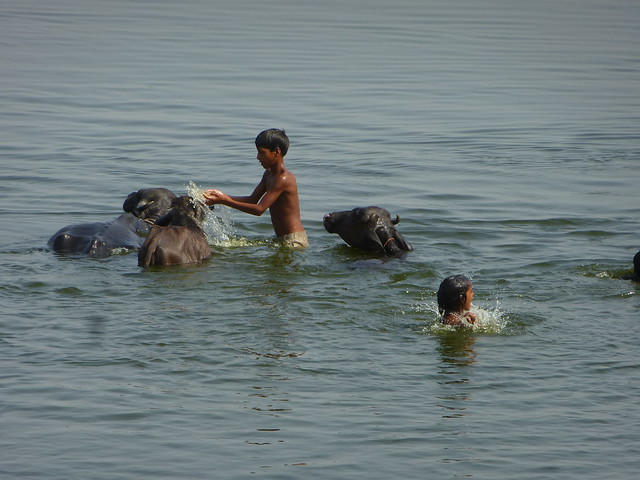I was sitting in the Old Delhi railway station waiting room when I heard cries between me. 'Hat! Hat!' screamed the woman attendant. I looked around. It was not a stray animal she was shooing out in that manner. It was a sleeping man. He woke, got up meekly and asked for permission to go to the loo before he left. 'No!' screamed the woman again. I went cold with nervousness and guilt. My turn next, I thought, even as I knew that it would not come.
This was the 'upper class' waiting room- for passengers who have purchased a 3-tier AC ticket. The man who was being thrown out presumably had a sleeper class ticket. So did I. I too, was an interloper.
But I would not be thrown out, I knew. And I was both reassured and mortified by that. The being reassured is simple enough, the mortification needs some explanation.
See, what was the difference between me and that unlucky man? We both had sleeper tickets, we were both looking for a place to spend a few hours between trains. The difference was my being of a family of atleast four 'educated' generations, on both sides. And their being educated at that time could only happen because they were brahmins.
And today, because of them, I exude that something which makes the waiting room attendants believe that I belong in the Upper Class area. In the waiting room it was my computer. But the previous night, I was lying in my sleeper (non-AC) berth swaddled in Mian's lungi. Half-asleep, I could hear the ticket collector make his way up the compartment. He was business like to the point of being curt. 'Ticket dikhao' is all he said over and over again. And then I heard him say 'Hello Madam, your ticket please'. The three generations of brahmins apparently are visible even through a lungi.
It makes me uncomfortable, this cloak of privilege.
Disclaimer: I don't normally use my cloak. The ladies' waiting room was closed for maintenance, and the general one was shadowy and forbidding.
This was the 'upper class' waiting room- for passengers who have purchased a 3-tier AC ticket. The man who was being thrown out presumably had a sleeper class ticket. So did I. I too, was an interloper.
But I would not be thrown out, I knew. And I was both reassured and mortified by that. The being reassured is simple enough, the mortification needs some explanation.
See, what was the difference between me and that unlucky man? We both had sleeper tickets, we were both looking for a place to spend a few hours between trains. The difference was my being of a family of atleast four 'educated' generations, on both sides. And their being educated at that time could only happen because they were brahmins.
And today, because of them, I exude that something which makes the waiting room attendants believe that I belong in the Upper Class area. In the waiting room it was my computer. But the previous night, I was lying in my sleeper (non-AC) berth swaddled in Mian's lungi. Half-asleep, I could hear the ticket collector make his way up the compartment. He was business like to the point of being curt. 'Ticket dikhao' is all he said over and over again. And then I heard him say 'Hello Madam, your ticket please'. The three generations of brahmins apparently are visible even through a lungi.
It makes me uncomfortable, this cloak of privilege.
Disclaimer: I don't normally use my cloak. The ladies' waiting room was closed for maintenance, and the general one was shadowy and forbidding.






















